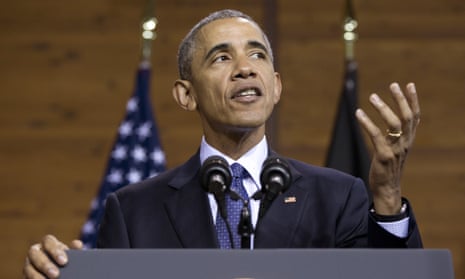The most forceful message to have emerged in recent years about Europe’s unity and values has just come from an outsider, the US president. In his speech in Hanover this week he told Europeans not to retreat from the extraordinary achievements of the postwar years but to consolidate them and to repudiate those who want to turn back to the narrow nationalism of the past.
Sometimes it takes a friend to point out your virtues or stiffen your resolve, and the American president has been such a friend on his visit to Europe. In London, he tried to improve the odds on Britain staying in the European Union with forthright warnings about our plight should the UK choose to leave. In Hanover he addressed to all Europeans what amounted to a pep talk. It was a flattering discourse, and much of it was cliche, but if there is anyone who can lift cliche to a higher level it is Obama. Almost 60 years after its founding, the European project needs a resounding narrative for itself, something to restore the confidence of citizens courted by populists of all stripes.
Obama has tried to provide it. He sees a “defining moment” because “what happens on this continent has consequences for people around the globe. If a unified, peaceful, liberal, pluralistic, free-market Europe begins to doubt itself … we will be empowering those who argue that democracy can’t work”. At the beginning of his presidency, with all the talk about the “pivot to Asia”, he was less than wholly engaged with the old continent. His continued belief in the importance to the United States of the Pacific world cannot be doubted, but he has learned that Washington cannot neglect a chaotic Middle East or a faltering Europe.
The latest news from the political frontline in Europe comes from Austria, where Norbert Hofer, the candidate of the anti-immigration and Eurosceptic Freedom party, came first by a large margin in the first round of the presidential elections at the weekend. The result was celebrated by far-right politicians across Europe, including Geert Wilders in the Netherlands, Marine Le Pen in France, and leaders of Italy’s Lega Nord and Germany’s National Democratic party. If Mr Hofer wins a second round it would strengthen the Eurosceptic bloc within the EU. But even if he does not, the fact that the presidency will in any event be held for the first time ever by a politician from outside the two major established parties says a lot about the alienation of Austrian voters.
In this they do not differ much from other electorates across Europe, although there is an important difference between new political forces on the left, which tend to be pro-EU, if sometimes in a lukewarm way, and new formations on the right, usually anti-EU, even if in practice they do not actually want to leave. Mr Obama acknowledged the “concerns and anxieties” that underlie such alienation: “They cannot be ignored and they deserve solutions from those in power.” But as he himself has reason to know after two terms in office, that is easier said than done, whether in America or in Europe. He did not offer any such solutions, which anyway do not come in handy packets. What he did instead, in the words of the popular song, was to say that, when things look dark, “accentuate the positive, eliminate the negative, and … don’t mess with Mr In-Between”. Thanks, Mister President. We needed that.
